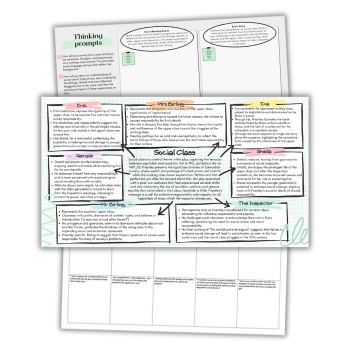This free An Inspector Calls class quotes resource contains question prompts, example answers and a mind map for students to record their ideas.
There are also selected quotes from An Inspector Calls about social class that you can discuss using a visualiser, or print out the document to use as a handout.
Writing tasks
The included thinking prompts sheet helps students approach the theme of class in An Inspector Calls from a more creative perspective.
Students will write a scene from Eva Smith’s perspective, where Eva reflects on her encounters with the Birlings, Gerald or other upper-class characters.
The scene could depict Eva just after she has been fired, left by Gerald or denied help by Mrs Birling.
Students will also explore Eva’s perspective on social class. They will write a diary entry (or entries) from Eva Smith’s point of view, reflecting on her encounters with the Birlings, Gerald and the upper class.
In their writing, they will need to show the emotional and social impact of class inequality in An Inspector Calls.
Class questions to consider
- How does An Inspector Calls use the theme of social class to reflect the tensions between capitalism and socialism?
- Why is the play’s setting in 1912 significant to its exploration of social class?
- How might the play’s message about social inequality have resonated with audiences in 1946, just after World War II?
- What do you think is Priestley’s main message in relation to social class?
Eric
- How does Eric’s behaviour toward Eva Smith expose the hypocrisy of the upper class?
- What might Eric’s alcoholism and irresponsibility suggest about the moral state of the privileged class?
- How does Eric’s remorse differ from the attitudes of his parents, and what does this suggest about generational change?
- Why is Eric’s eventual remorse important for Priestley’s message of social reform?
Mrs Birling
- In what ways does Mrs Birling embody the arrogance and moral superiority of the upper class?
- How does Mrs Birling’s treatment of Eva Smith reflect the cruelty and indifference of the upper class?
- Why does Mrs Birling refuse to accept responsibility for Eva’s death?
- What does Priestley suggest about the moral failings of those in power through Mrs Birling’s character?
Mr Birling
- How does Mr Birling represent the capitalist upper class?
- What are some examples of Mr Birling’s obsession with profits and dismissal of workers’ rights?
- How does Mr Birling’s attitude toward events like the Titanic and war reflect Priestley’s critique of the ruling class?
- Why do you think Priestley uses Mr Birling to highlight capitalist greed?
Eva
- How does Eva Smith represent the oppressed working class in the play?
- In what ways does Priestley use Eva’s story to show the harsh realities of life for those without wealth or status?
- Why do you think Priestley chose to have Eva Smith never appear on stage, and how does this affect the audience’s perception of her?
Gerald
- What social class does Gerald represent?
- In what ways does Gerald exploit Eva for his own benefit, and how does this reflect his attitude toward social class?
- Why does Gerald distance himself from responsibility? What does this suggest about his character?
- How does Gerald’s decision to side with the older generation show his determination to protect class privilege and power?
Sheila
- How does Sheila’s attitude toward social class change throughout the play?
- Why is Sheila’s character considered a symbol of the younger generation’s potential for change?
- Why is Sheila’s remorse important?
- What does Sheila’s journey say about the possibility of social awareness and responsibility in future generations?
The Inspector
- How does the Inspector act as Priestley’s mouthpiece for socialist ideas?
- What are some key points from the Inspector’s speech that challenge the characters ’ attitudes toward social class?
- Why does the Inspector encourage each character to take responsibility for Eva’s suffering?
- What is the significance of the Inspector’s warning about “fire and blood and anguish,” and how does this relate to social class struggles in the 20th century?
Key vocabulary
- Capitalism
- Socialism
- Class Division
- Privilege
- Exploitation
- Responsibility
- Hierarchy
- Empathy
- Inequality
- Patriarchy
- Conscience
- Morality
- Collective responsibility
- Oppression
- Individualism
- Cronyism
- Aristocracy
An Inspector Calls class quotes
“I was an alderman for years – and Lord Mayor two years ago – and I’m still on the Bench”
“I don’t play golf”
“If you don’t come down sharply on some of these people, they’d soon be asking for the earth”
“You mustn’t try to build up a kind of wall between us and that girl”
“I have an idea that your mother – Lady Croft – while she doesn’t object to my girl – feels you might have done better for yourself socially”
“I don’t suppose for a moment that we can understand why the girl committed suicide. Girls of that class -”
“gross impertinence – quite deliberate – and naturally that was one of the things that prejudiced me against her case”
“claiming elaborate fine feelings and scruples that were simply absurd in a girl in her position”
“It would do us all a bit of good if sometimes we tried to put ourselves in the place of these young women counting their pennies in their dingy little back bedrooms”
“And so you used the power you had, as a daughter of a good customer and also of a man well known in the town, to punish the girl”
Elaine McNally is an author, AH T&L and former English HoD. For more information, visit her blog at mrsmacteach33.wordpress.com.














